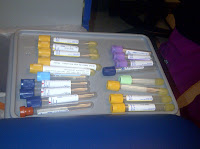So, we saw Dr. Gruessner and his PA Rob today. Dr. G doesn't have quite the bedside manner as Dr. Rilo, but he definitely knows his stuff. Both Gruessner and Rob are from UMN where they worked with Dr. Sutherland, the pioneer of the TP-IAT. It was like Lew and I were on an interview panel where we had all of our notes, taking turns to ask them questions. It was pretty funny! The appointment was mostly just us asking our questions, so I'll just fill in the blanks on the questions I had already typed and printed.
What is life expectancy after TP-IAT? Same as anyone else.
Do islets "burn out" after a few years in the liver? If so, does it help to stay on some insulin just so they don't have to work so hard? No, they don't burn out. You are kept on insulin for the first 6 months or so, so the islets aren't too overworked, but after 6 months you're probably pretty close to how you will end up.
Is the biliary duct removed in the pancreatectomy? (I've heard some folks say that they still have SOD after the TP-IAT.) Yes, the biliary duct is cut out. You cannot get SOD after you have the TP-IAT.
How many TP-IATs have you performed? They do 20-40 a year here in Tucson. Dr. G has done hundreds.
How does my lack of a spleen and gall bladder effect the surgery/recovery? It has no impact.
Does my divisum make anything with my surgery different/difficult? No
Side effects - what are the most common side effects short term/long term? How common are intestinal blockages? Less than 10% of people have complications after surgery. Obviously, diabetes can occur. You have a 50% chance of being diabetic long term.
What does the surgical scar look like? Can you use my existing incision? Can you look for hernias/weak spots in my abdominal wall? Yes, they will use my existing scar - about 2/3rds of it. Usually they go across the belly but he won't make me look like a patchwork quilt. He does not want to mess with repairing any of my existing nerve damage around my current scar yet because it's possible that I could have the same issues after this surgery. Once they get me all fixed up, then they'll evaluate if more needs to be done and only do it once.
Will/can I be given an epidural during surgery? I have heard it helps with pain when I wake up. It's a possibility, depending on how much blood thinners that they use on me during surgery. If they use lots, there is an increased risk of bleeding which they want to avoid.
After surgery, will I have an NG or JG tube? NG. This is a tube that goes in through your nose, down your throat, through your stomach and into the intestines. It's used to drain any bile that leaks through one of the new connections they make. It is also used for feeding during the first few days. It stays in until I can eat on my own and have a bm so we know the guts are working right.
What % of patients have ghost pains after surgery? How long do they last? About 25% of patients have ghost pains for several weeks after the surgery. Long term (6-12 months) after the surgery, about 30% have no pain at all; 35% have some, but greatly reduced, pain; 25% have significant pain. One thing he's noticed is that those who are employed and enjoy their jobs have a much better result. Hmmm...employed AND like my job? That may be stretching it a bit...
Some other things mentioned:
Because this surgery is basically gastric bypass on surgery, I will lose 15-25 lbs in the first 6 months after surgery. (Thank god!)
This surgery has a very long and hard recovery. It will take between 6-12 months before I start to feel human again. They are basically gutting me and then re-attaching every organ in a new way.
The first 2 days after surgery, I will be in excrutiating pain. No amount of painkillers will take the pain away. But, if you can get through those first 2 days, the 3rd day will be much much better. (I asked him what happens if you CAN'T get through those first 2 days...) He really wanted to emphasize that the pain is very significant and wanted us to be aware of that. Yuck.
Rob was talking about one lady they operated on was taking 4500 mg of morphine a day. Yes, four thousand five hundred! (And my Dr had a hiss fit when I was taking 90 mg a day...) After the TP-IAT, she got down to 1000 mg/day. I have no idea what she's doing now.
So, I think that's about it. They do the surgery on Thursdays. If the insurance approval goes well, they still have some open spots in Feb. But, there are several people going through testing right now, so it's a matter of who wins the insurance race. I'm just going to count on March so I won't be disappointed. Then anything earlier will be a bonus!
Oh, one last thing! Check out this photo - I had some blood work today and they filled up every vial on that tray, plus 10 more that didn't fit on the tray. Yes...28 vials! Plus a scoop o' poop. This disease is so glamorous...

No comments:
Post a Comment